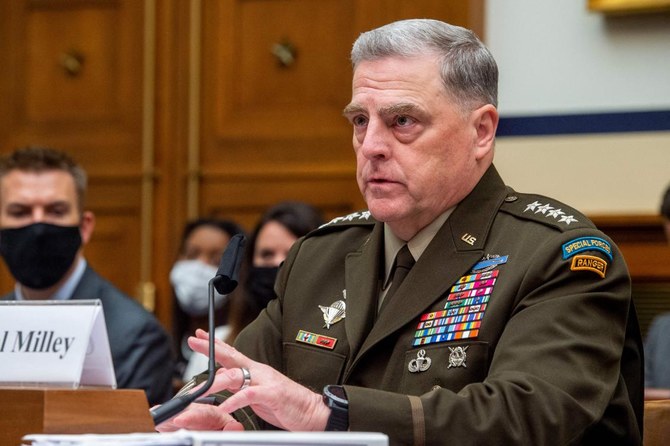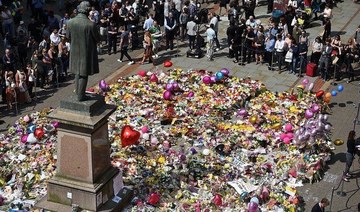WASHINGTON: The top US military officer called the 20-year war in Afghanistan a “strategic failure”. He acknowledged to Congress that he had favored keeping several thousand troops in the country to prevent a collapse of the US-supported Kabul government and a rapid takeover by the Taliban.
Republicans on the Senate Armed Services Committee pointed to the testimony Tuesday by Gen. Mark Milley, chairman of the Joint Chiefs of Staff, as evidence that President Joe Biden had been untruthful when, in a television interview last month, he suggested the military had not urged him to keep troops in Afghanistan.
Milley refused to say what advice he gave Biden last spring when Biden was considering whether to comply with an agreement the Trump administration had made with the Taliban to reduce the American troop presence to zero by May 2021, ending a US war that began in October 2001. Testifying alongside Milley, Defense Secretary Lloyd Austin also refused to reveal his advice to Biden.
Austin and Milley were appearing Wednesday before the House Armed Services Committee to review the war.
Milley told the Senate committee, when pressed Tuesday, that it had been his personal opinion that at least 2,500 US troops were needed to guard against a collapse of the Kabul government and a return to Taliban rule.
Defying US intelligence assessments, the Afghan government and its US-trained army collapsed in mid-August, allowing the Taliban, which had ruled the country from 1996 to 2001, to capture Kabul with what Milley described as a couple of hundred men on motorcycles, without a shot being fired. That triggered a frantic US effort to evacuate American civilians, Afghan allies and others from Kabul airport.
Gen. Frank McKenzie, who as head of Central Command was overseeing US troops in Afghanistan, said he shared Milley’s view that keeping a residual force there could have kept the Kabul government intact.
“I recommended that we maintain 2,500 troops in Afghanistan, and I also recommended early in the fall of 2020 that we maintain 4,500 at that time, those were my personal views,” McKenzie said. “I also had a view that the withdrawal of those forces would lead inevitably to the collapse of the Afghan military forces and eventually the Afghan government.”
The six-hour Senate hearing marked the start of what is likely to be an extended congressional review of the US failures in Afghanistan. The length and depth of the hearing stood in contrast to years of limited congressional oversight of the war and the hundreds of billions of taxpayer dollars it consumed.
“The Republicans’ sudden interest in Afghanistan is plain old politics,” said Sen. Elizabeth Warren, a Massachusetts Democrat, who supported Biden’s decision to end US involvement there.
The hearing at times was contentious, as Republicans sought to portray Biden as having ignored advice from military officers and mischaracterized the military options he was presented last spring and summer.
Several Republicans tried unsuccessfully to draw Milley, McKenzie and Austin into commenting on the truthfulness of Biden’s statement to ABC News on Aug. 18, three days after the Taliban took control of Kabul, that no senior military commander had recommended against a full troop withdrawal when it was under discussion in the first months of Biden’s term.
When asked in that interview whether military advisers had recommended keeping 2,500 troops in Afghanistan, Biden replied, “No. No one said that to me that I can recall.” He also said the advice “was split.”
White House press secretary Jen Psaki said Tuesday that Biden was referring to having received a range of advice.
“Regardless of the advice, it’s his decision, he’s the commander in chief,” she said.
In a blunt assessment of a war that cost 2,461 American lives, Milley said the result was years in the making.
“Outcomes in a war like this, an outcome that is a strategic failure — the enemy is in charge in Kabul, there’s no way else to describe that — that is a cumulative effect of 20 years,” he said, adding that lessons need to be learned, including whether the US military made the Afghans overly dependent on American technology in a mistaken effort to make the Afghan army look like the American army.
Republican Sen. Tom Cotton of Arkansas asked Milley why he did not choose to resign after his advice was rejected.
Milley, who was appointed to his position as chairman of the Joint Chiefs of Staff by President Donald Trump and retained by Biden, said it was his responsibility to provide the commander in chief with his best advice.
“The president doesn’t have to agree with that advice,” Milley said. “He doesn’t have to make those decisions just because we are generals. And it would be an incredible act of political defiance for a commissioned officer to resign just because my advice was not taken.”
Austin defended the military’s execution of a frantic airlift from Kabul in August and asserted it will be “difficult but absolutely possible” to contain future threats from Afghanistan without troops on the ground.
Milley cited “a very real possibility” that Al-Qaeda or the Daesh group’s Afghanistan affiliate could reconstitute in Afghanistan under Taliban rule and present a terrorist threat to the United States in the next 12 to 36 months.
It was Al-Qaeda’s use of Afghanistan as a base from which to plan and execute its attacks on the United States on Sept. 11, 2001, that triggered the US invasion of Afghanistan a month later.
“And we must remember that the Taliban was and remains a terrorist organization and they still have not broken ties with Al-Qaeda,” Milley said. “I have no illusions who we are dealing with. It remains to be seen whether or not the Taliban can consolidate power or if the country will further fracture into civil war.”
Austin questioned decisions made over the 20-year course of the US war in Afghanistan. In retrospect, he said, the American government may have put too much faith in its ability to build a viable Afghan government.
“We helped build a state, but we could not forge a nation,” he told the Senate committee. “The fact that the Afghan army we and our partners trained simply melted away – in many cases without firing a shot – took us all by surprise. It would be dishonest to claim otherwise.”
Asked why the United States did not foresee the rapid collapse of the Afghan army, Milley said that in his judgment the US military lost its ability to see and understand the true condition of the Afghan forces when it ended the practice some years ago of having advisers alongside the Afghans on the battlefield.
“You can’t measure the human heart with a machine, you have to be there,” Milley said.
Joint Chiefs chairman calls Afghan war a ‘strategic failure’
https://arab.news/rj4x9
Joint Chiefs chairman calls Afghan war a ‘strategic failure’

- Austin and Milley were appearing Wednesday before the House Armed Services Committee to review the war
- The six-hour Senate hearing marked the start of what is likely to be an extended congressional review of the U.S. failures in Afghanistan
Civilians evacuated from northeast Ukraine as Russia steps up assault

- Heavy fighting raged on Sunday as Russia attacks 27 settlements
KYIV: Thousands more civilians have fled Russia’s renewed ground offensive in Ukraine’s northeast that has targeted towns and villages with a barrage of artillery and mortar fire, officials said Sunday.
The intense battles have forced at least one Ukrainian unit to withdraw in the Kharkiv region, capitulating more land to Russian forces across less defended settlements in the so-called contested “gray zone” along the Russian border.
Meanwhile, a 10-story apartment block collapsed in the Russian city of Belgorod, near the border, with several deaths and injuries reported. Russian authorities said the building collapsed following Ukrainian shelling. Ukraine has not commented on the incident.
HIGHLIGHT
The Russian Defense Ministry said Saturday that Moscow’s forces had captured five villages on the border of Ukraine’s Kharkiv region and Russia. Ukraine’s leadership has not confirmed Moscow’s gains.
At least 4,000 civilians have fled the Kharkiv region since Friday, when Moscow’s forces launched the operation, Gov. Oleh Syniehubov said in a social media statement. Heavy fighting raged Sunday along the northeast front line, where Russian forces attacked 27 settlements in the past 24 hours, he said.
Analysts say the Russian push is designed to exploit ammunition shortages before promised Western supplies can reach the front line. Ukrainian soldiers said the Kremlin is using the usual Russian tactic by launching a disproportionate amount of fire and infantry assaults to exhaust their troops and firepower.
It comes after Russia stepped up attacks in March targeting energy infrastructure and settlements, which analysts predicted were a concerted effort by Moscow to shape conditions for an offensive.
Ukrainian President Volodymyr Zelenskyy said that disrupting Russia’s offensive in the area was a priority, and that Kyiv’s troops were continuing counteroffensive operations in seven villages around the Kharkiv region.
“Disrupting the Russian offensive intentions is our number one task now. Whether we succeed in that task depends on every soldier, every sergeant, every officer,” Zelenskyy said.
The Russian Defense Ministry said Saturday that Moscow’s forces had captured five villages on the border of Ukraine’s Kharkiv region and Russia. These areas were likely poorly fortified due to the dynamic fighting and constant heavy shelling, easing a Russian advance.
Ukraine’s leadership has not confirmed Moscow’s gains.
Black, Asian and minority ethnic people make up nearly 70% of UK’s anti-terror detentions, data shows

- Fewer than 1 in 5 who were stopped were recorded as white
LONDON: Nearly 70 percent of people stopped at UK ports under anti-terrorism laws since 2021 were from Black, Asian and minority ethnic backgrounds, new figures released on Sunday show.
The Guardian newspaper requested police data under freedom of information laws, which also revealed fewer than one in five who were stopped were recorded as white.
Campaigners have criticized the statistics, saying they prove the UK’s anti-terrorism laws are disproportionately affecting Black and minority ethnic groups and not being used effectively enough to arrest the rise of far-right, white extremism, The Guardian reported.
Of the 8,095 people stopped at UK ports since 2021 under Schedule 7 of the Terrorism Act 2000, 5,619 (69.4 percent) were recorded as being from Black, Asian and minority ethnic backgrounds, compared with 1,585 (19.6 percent) recorded as white British, white Irish or white other stopped under the same law.
The head of public advocacy at the anti-Islamophobia group Cage International has also pressed British police to publish data on the religious background of those stopped under the Terrorism Act.
Anas Mustapha said: “This new data reaffirms what we already know about its racist and Islamophobic impact. However, despite evidence demonstrating that the majority of those stopped are Muslim and that forces record data on religion, the government has resisted calls to produce a religious breakdown of those harassed at the borders.
“Schedule 7 is one of the most intrusive and discriminatory of all police powers. We’ve supported hundreds of British holidaymakers impacted by the policy and it’s clear that the power is abused and must be repealed.”
A spokesman from the UK’s counter-terrorism police said the law was a “vital tool” in collecting evidence to support convictions of terrorists, as well as helping with intelligence-gathering in the prevention of attacks on British streets.
“The use of Schedule 7 powers regularly features in some of our most complex and high-risk investigations and prosecutions,” the spokesman said.
“We face an enduring terrorist threat from overseas, and whilst we are seeing a much greater prevalence of online activity, travel remains an element of terrorist methodology that provides us with potentially crucial opportunities to act.
“Where the powers are used, there are a range of robust safeguards and measures in place to ensure appropriate usage.”
OIC calls for immediate aid amid Afghan flood crisis

- Flash floods from seasonal rains in Baghlan province in northern Afghanistan
RIYADH: The Organization of Islamic Cooperation has issued an urgent appeal to its member states as well as relief organizations to provide aid to the Afghan people amid catastrophic flooding which has hit the country, Saudi Press Agency reported on Sunday.
Flash floods from seasonal rains in Baghlan province in northern Afghanistan killed at least 315 people since striking on Friday, a UN report said.
Rains also caused heavy damage in northeastern Badakhshan province and central Ghor province, officials said.
Since mid-April, floods have left about 100 people dead in 10 of Afghanistan’s provinces, with no region entirely spared, according to authorities.
Farmland has been swamped in a country where 80 percent of the more than 40 million people depend on agriculture to survive.
UK investigating Hamas’ claim that British hostage killed in Gaza

- Foreign secretary confirms viewing video
LONDON: The UK’s Foreign Office said on Sunday it was investigating a claim by Hamas that a British-Israeli hostage in Gaza had died from injuries sustained in an Israeli airstrike over a month ago.
Nadav Popplewell, 51, was captured along with his mother Channah Peri on Oct. 7 during a border incursion when the Palestinian group launched a surprise attack on Israel.
The Foreign Office said it was actively seeking more information on the matter.
Popplewell’s family has requested media outlets refrain from airing footage released by Hamas, showing him in captivity with visible injuries, the BBC reported.
The UK’s Foreign Secretary David Cameron, speaking to the BBC’s Laura Kuenssberg, confirmed viewing the video but provided no further updates on the investigation.
Cameron said: “We don’t want to say anything until we have better information.”
He described Hamas as “callous” for releasing the video and playing “with the family’s emotions in that way.”
The Foreign Office added that the department’s thoughts “are with his family at this extremely distressing time.”
The Israeli military has not issued a statement on the matter.
Israel’s military campaign in Gaza to destroy Hamas has killed over 34,900 people, the majority of whom are women and children, according to the Gaza Health Ministry.
Israel has reported that 128 hostages are unaccounted for.
UK mountaineer logs most Everest climbs by a foreigner, Nepali makes 29th ascent

- Both climbers used Southeast Ridge route to summit
- They were on separate expeditions guiding their clients
KATMANDU: A British climber and a Nepali guide have broken their own records for most climbs of Mount Everest, the world’s highest mountain, hiking officials said on Sunday.
Rakesh Gurung, director of Nepal’s Department of Tourism, said Britain’s Kenton Cool, 50, and Nepali guide Kami Rita Sherpa, 54, climbed the 8,849-meter (29,032 foot) peak for the 18th and 29th time, respectively.
They were on separate expeditions guiding their clients.
“He just keeps going and going... amazing guy!” Garrett Madison of the US-based expedition organizing company Madison Mountaineering said of the Nepali climber. Madison had teamed up with Kami Rita to climb the summits of Everest, Lhotse, and K2 in 2014.
K2, located in Pakistan, is the world’s second-highest mountain and Lhotse in Nepal is the fourth-tallest.
Lukas Furtenbach of the Austrian expedition operator Furtenbach Adventures called Cool’s feat remarkable.
“He is a fundamental part of the Everest guiding industry. Kenton Cool is an institution,” Furtenbach, who is leading an expedition from the Chinese side of Everest, told Reuters.
Both climbers used the Southeast Ridge route to the summit.
Pioneered by the first summiteers, New Zealander Sir Edmund Hillary and Sherpa Tenzing Norgay in 1953, the route remains the most popular path to the Everest summit.
Kami Rita first climbed Everest in 1994 and has done so almost every year since, except for three years when authorities closed the mountain for various reasons.
He climbed the mountain twice last year.
Mountain climbing is a major tourism activity and a source of income as well as employment for Nepal, home to eight of the world’s 14 tallest peaks, including Everest.
Nepal has issued 414 permits, each costing $11,000 to climbers for the climbing season that ends this month.




















